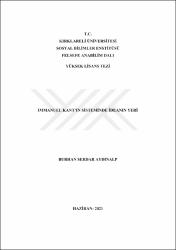| dc.contributor.advisor | Dağ, Ahmet | |
| dc.contributor.author | Aydınalp, Burhan Serdar | |
| dc.date.accessioned | 2021-12-11T19:41:41Z | |
| dc.date.available | 2021-12-11T19:41:41Z | |
| dc.date.issued | 2021 | |
| dc.identifier.uri | https://tez.yok.gov.tr/UlusalTezMerkezi/TezGoster?key=tqUiYt63sTQLTpozMJ92QlKingVOl-aRYvqWcvZ1_oq8FoSQQjOZhZSktxOxdW_f | |
| dc.identifier.uri | https://hdl.handle.net/20.500.11857/1534 | |
| dc.description | YÖK Tez: 690890 | |
| dc.description.abstract | İdeaların; Kant'ın sistemde, saf aklın düzenleyici kavramları olarak, bilim ve sistem kuran temel fikir olarak ve tekilleşmiş bireysel idea ya da ideal olarak temel, belirleyici bir rolü bulunmaktadır. Kant'ın bilgi teorisinden ahlak metafiziğine, tarih felsefesinden estetik vb. kuramına kadar sisteminin hemen her alanında ideanın izini sürmek mümkündür. Kant, İdeler konusunu Saf Aklın Eleştirisi'nin "Aşkınsal Diyalektik" bölümünde ele alır. "Genel Olarak İdealar" başlığı altında Platon'un idea anlayışını yorumlar ve kendi idea kavramını "Aşkınsal İdealar" ve "Aşkınsal İdealar Dizgesi" başlığı altında sunar. Geleneksel metafiziğin Ruh, Evren ve Tanrı konusundaki iddialarını eleştiren Kant, Saf Aklın Eleştirisi'nde Arı Usun Bozuk vargıları'nda (paroloji) Ruh İdeasını, Arı Usun çatışkıları'nda (Antinomi) Evrenbilimsel (Kosmos) İdeaları ve Arı Usun İdeali kısmında ise Tanrı İdeasını inceler. Bu çalışmada Kant'ın, Platon'un idealarını kavrayışı ve kendi idea anlayışı; Saf Aklın Eleştirisi eserindeki teorik aklın ideleri ve Pratik Aklın Eleştirisi eserindeki pratik akıl bağlamında ele alınacaktır. Ahlak ve Özgürlük İdesi üzerinde durulduktan sonra üçüncü kritiği olan "Yargı Yetisinin Eleştirisi" eserinde mevzu olunan "Estetik İdealara" da kısaca değinilecektir." | |
| dc.description.abstract | In Kantian system, ideas as regulatory concepts of pure reason, science and system founding basic thought and singularized individual idea or ideal have a basic, decisive role. It is possible to trace idea in almos twhole fields of his system from Kant's knowledge theory to metaphysics of morals, from historical philosophy to aesthetics, etc. theory. Kant discusses Ideas in Critiqueof Pure Reasonon the chapter "Transcendental Dialectic." Under the topic of "General Ideas" he evaluates the idea concept of Platon and presents his own idea concept under the headline of "Transcendental Ideas" and "TranscendentaI deas System". Kant, after criticizing the arguments of traditional metaphysics about Soul, Cosmos and God, in the Critique of Pure Reason studies Soul Idea, under the headline "Paralogisms of Pure Reason," explores Cosmological İdeas in "Antinomy of Pure Reason" and the Idea of God's existence under "Ideal of Pure Platon's Theory of Ideas, elaborate how Kant Reason." In this work we shall discuss conceives Platon's ideas and we shall try to explain Kant's idea concept in his first critique in respect to theoretical Ideas of Reason and in his second critique as Practical Reason, Morale and Idea of Freedom. We shall also shortly refer to the "Aesthetical Ideas" which Kant mentions in Critique of the Power of Judgement. | |
| dc.language.iso | tur | |
| dc.publisher | Kırklareli Üniversitesi | |
| dc.rights | info:eu-repo/semantics/openAccess | |
| dc.subject | Felsefe | |
| dc.subject | Philosophy | |
| dc.subject | Transandantal felsefe | |
| dc.subject | Transcendental philosophy | |
| dc.subject | İdea | |
| dc.subject | Idea | |
| dc.subject | İdea | |
| dc.subject | İdeal | |
| dc.subject | Transandantal | |
| dc.subject | Etik | |
| dc.subject | Özgürlük | |
| dc.subject | Idea | |
| dc.subject | Ideal | |
| dc.subject | Transcendental | |
| dc.subject | Ethic | |
| dc.subject | Freedom, | |
| dc.title | İmmanuel Kant'ın sisteminde ideanın yeri | |
| dc.title.alternative | Idea in Kantian system | |
| dc.type | masterThesis | |
| dc.department | Enstitüler, Sosyal Bilimler Enstitüsü, Felsefe Ana Bilim Dalı | |
| dc.identifier.startpage | 1 | |
| dc.identifier.endpage | 129 | |
| dc.relation.publicationcategory | Tez | |
| dc.institutionauthor | Aydınalp, Burhan Serdar | |



















